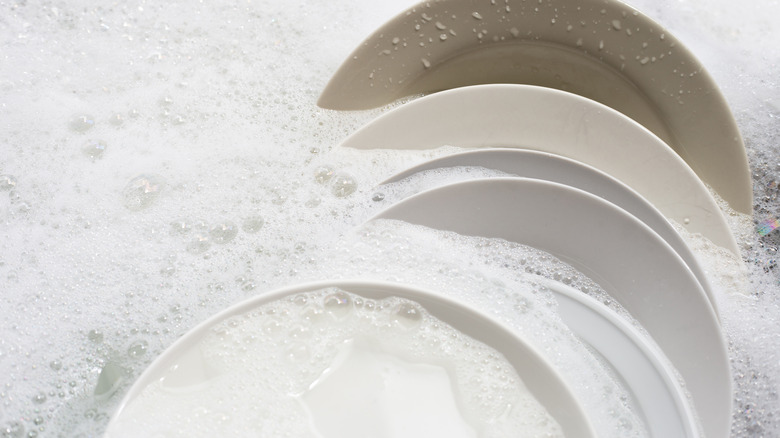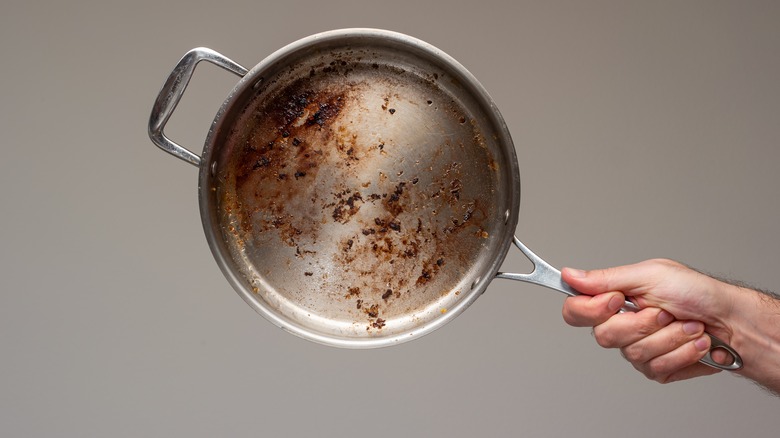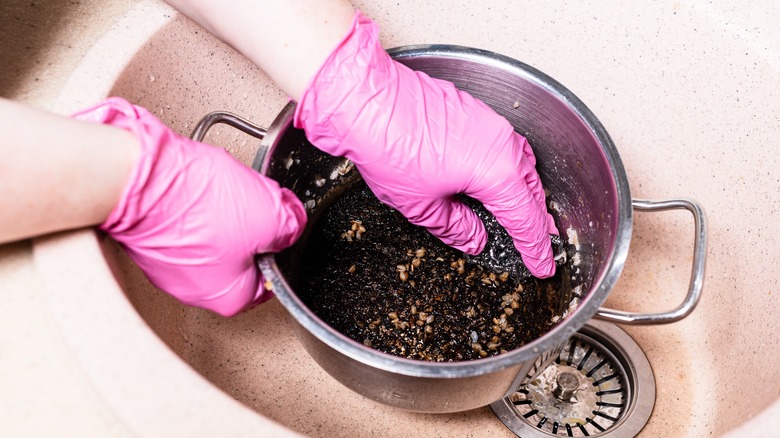You're Soaking Your Dishes Wrong. Here's How To Do It Right
Here's the most common expectation. A burnt-on sauce or sticky, cheesy substance stuck on a pan is easier to wash away if you allow it to soak, and the more you soak it, the better. The belief here is that soaking allows the moisture to penetrate deeply into the stuck-on material, weakening its ability to remain in place. That could mean that after a 24-hour soak, you just need to wipe away the mess. That's rarely true. In fact, soaking your dishes for hours may not do much else but delay the process of scrubbing them clean.
Why is that the case? A significant burn on a metal skillet isn't just about the food particles sticking to the pan's surface. Rather, the high heat turns the food into carbon, and that intense heat allows the carbon to not just stick to the surface but bond with it. When you remove the pot from the heat, that instantly starts the cooling process, trapping the food. It's a much simpler version of what happens during the welding process.
Soaking your dishes for a few hours can offer some help in minimizing the workload, especially for non-metal surfaces, but longer than that doesn't make a big difference. Instead, get out the scrubby and wash your dishes as soon as you take them off the heat for the best results.
Why soaking doesn't do a lot of good
You may be thinking that it's certainly easier to scrub away that baked-on noodle casserole after it's soaked. In ceramic or your average plate, that may work. Yet, anything in a metal pan that's been directly placed over heat isn't likely to improve enough to create a clean surface. Most of the time, even a brand-new pan will have tiny imperfections on the surface of the metal. Looked at microscopically, you'll see this isn't really a flat surface at all. Those jagged areas, even if you can't see them, are what allow the carbon to latch on and hold on tightly when heated and then cooled.
When you soak the material for a short time, from 15 minutes to four hours, that can soften some of the stuck-on food, but you'll still need to scrub burned pots and pans. That's because you need to use a chemical reaction or physical force to break those bonds between the food and the pan's surface. Soaking may help you remove the surface material and could help with that sticky cheese that didn't burn but just browned, but it won't eliminate the work you have to do to clean those dishes.
If you have a pan with a nonstick surface or one that's hard anodized, that's going to prevent those imperfections from interacting with the burned food. These materials smooth out the surface, making it harder for a bond to form.
So how do you soak your dishes?
You forgot that pot of sauce was cooking so high, and you've now ended up with a burnt-on mess. In this situation, start by scraping away anything you can as soon as you remove it from the surface of the heat to break that bond right away. Even if you don't do this, you can soak it in water for 15 to 30 minutes or, if you need more time, 3 to 4 hours. Use some dish soap or baking soda to help with the breakdown. This will help the surface particles to loosen. Anything longer than this isn't likely to offer any significant improvement.
Then, wash them clean. To help penetrate into the carbon, use a product like Bar Keepers Friend, which will create a simple chemical reaction with the carbon to help eliminate the bond. Follow the manufacturer's directions for use. If you don't have any, you'll need to use scrubbing power. Be careful not to use something that's too abrasive, as that's going to cause more significant damage to the surface of the pan. Scrubbing with hot water and detergent is often the best way to remove stains and discolorations.
This also eliminates the risk of another mess growing in your kitchen sink — the bacteria and germs that love the warm moisture and food source. By washing your dishes sooner, you prevent that growth from making sanitizing dishes that much more difficult.


